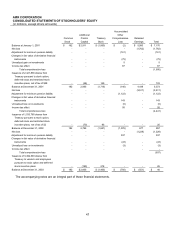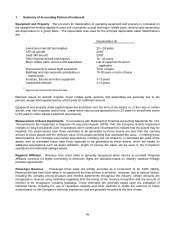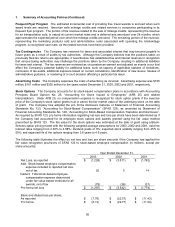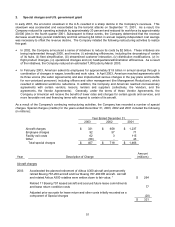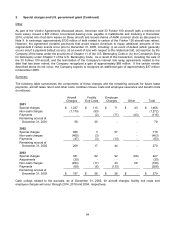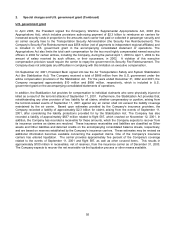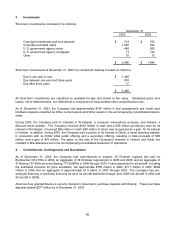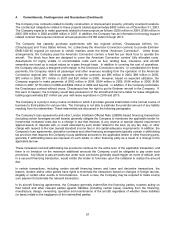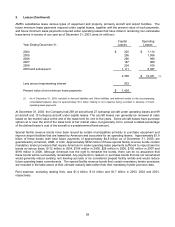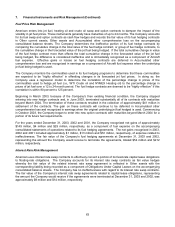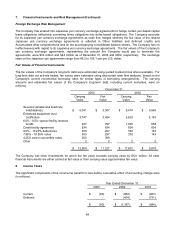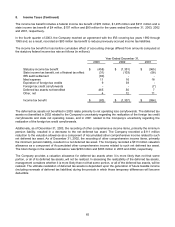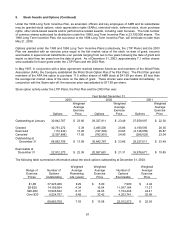American Airlines 2003 Annual Report Download - page 59
Download and view the complete annual report
Please find page 59 of the 2003 American Airlines annual report below. You can navigate through the pages in the report by either clicking on the pages listed below, or by using the keyword search tool below to find specific information within the annual report.57
4. Commitments, Contingencies and Guarantees (Continued)
The Company has contracts related to facility construction or improvement projects, primarily at airport locations.
The contractual obligations related to these projects totaled approximately $600 million as of December 31, 2003.
The Company expects to make payments related to these projects as follows: $250 million in 2004, $188 million in
2005, $93 million in 2006 and $69 million in 2007. In addition, the Company has an information technology support
related contract that requires minimum annual payments of $158 million through 2013.
The Company has capacity purchase agreements with two regional airlines, Chautauqua Airlines, Inc.
(Chautauqua) and Trans States Airlines, Inc. (collectively the American Connection carriers) to provide Embraer
EMB-140/145 regional jet services to certain markets under the brand “American Connection”. Under these
arrangements, the Company pays the American Connection carriers a fixed fee per block hour to operate the
aircraft. The block hour fees are designed to cover the American Connection carriers’ fully allocated costs.
Assumptions for highly volatile or uncontrollable costs such as fuel, landing fees, insurance, and aircraft
ownership are trued up to actual values on a pass through basis. In addition to covering the cost of operations,
the Company also pays a designed profit margin to the American Connection carriers. In consideration for these
payments, the Company retains all passenger and other revenues resulting from the operation of the American
Connection regional jets. Minimum payments under the contracts are $95 million in 2004, $69 million in 2005,
$70 million in 2006, $71 million in 2007 and $20 million in 2008. However, based on expected utilization, the
Company expects to make payments of $162 million in 2004, $164 million in 2005, $166 million in 2006, $168
million in 2007, $170 million in 2008 and $854 million in 2009 and beyond. In addition, if the Company terminates
the Chautauqua contract without cause, Chautauqua has the right to put its Embraer aircraft to the Company. If
this were to happen, the Company would take possession of the aircraft and become liable for lease obligations
totaling approximately $21 million per year with lease expirations in 2018 and 2019.
The Company is a party to many routine contracts in which it provides general indemnities in the normal course of
business to third parties for various risks. The Company is not able to estimate the potential amount of any liability
resulting from the indemnities. These indemnities are discussed in the following paragraphs.
The Company’s loan agreements and other London Interbank Offered Rate (LIBOR)-based financing transactions
(including certain leveraged aircraft leases) generally obligate the Company to reimburse the applicable lender for
incremental increased costs due to a change in law that imposes (i) any reserve or special deposit requirement
against assets of, deposits with, or credit extended by such lender related to the loan, (ii) any tax, duty, or other
charge with respect to the loan (except standard income tax) or (iii) capital adequacy requirements. In addition, the
Company’s loan agreements, derivative contracts and other financing arrangements typically contain a withholding
tax provision that requires the Company to pay additional amounts to the applicable lender or other financing party,
generally if withholding taxes are imposed on such lender or other financing party as a result of a change in the
applicable tax law.
These increased cost and withholding tax provisions continue for the entire term of the applicable transaction, and
there is no limitation on the maximum additional amounts the Company could be obligated to pay under such
provisions. Any failure to pay amounts due under such provisions generally would trigger an event of default, and,
in a secured financing transaction, would entitle the lender to foreclose upon the collateral to realize the amount
due.
In certain transactions, including certain aircraft financing leases and loans and derivative transactions, the
lessors, lenders and/or other parties have rights to terminate the transaction based on changes in foreign tax law,
illegality or certain other events or circumstances. In such a case, the Company may be required to make a lump
sum payment to terminate the relevant transaction.
In its aircraft financing agreements, the Company generally indemnifies the financing parties, trustees acting on
their behalf and other relevant parties against liabilities (including certain taxes) resulting from the financing,
manufacture, design, ownership, operation and maintenance of the aircraft regardless of whether these liabilities
(or taxes) relate to the negligence of the indemnified parties.


